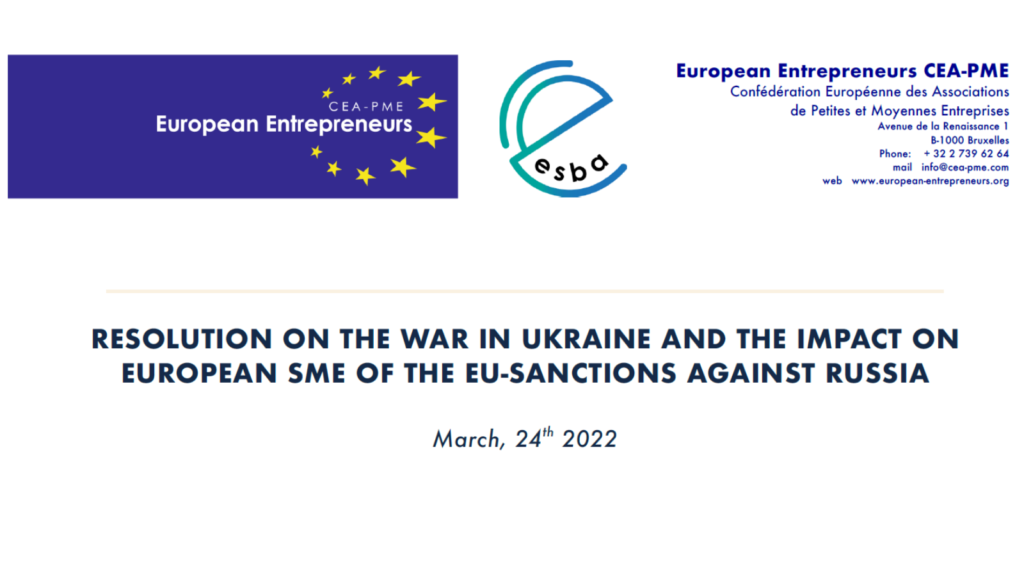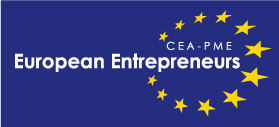
March, 24th 2022
European Entrepreneurs CEA-PME, the biggest European confederation of voluntarily associated Micro, Small and Medium-sized companies, together with ESBA – the European Small Business Alliance, are deeply concerned about the Russian war on Ukraine and the related impacts on Europe and European SMEs.
Maurizio Casasco, president of European Entrepreneurs CEA-PME and of the Italian SME Confederation CONFAPI declared on February 24th 2022 evening: “What is happening in Ukraine in these hours arouses dismay and deep concern in European citizens and entrepreneurs. This conflict in the heart of Europe comes at a time when the terrible effects of the pandemic crisis have not yet been completely overcome and while small and medium-sized industries, the cornerstone of the continent’s economy, are working hard for recovery. We hope that diplomacy and common sense will prevail and that a ceasefire and a peaceful solution will be reached as soon as possible”.
“As a confederation, we think in this moment of the millions of Ukrainian citizens that are living hours of fear for their lives, which were totally overturned in a day. We call for European solidarity together with appropriate answers from European Institutions and all EU-Member States, in order to bring back the parties to the negotiation tables. The EU must protect the lives of its citizens, strengthen the economy and ensure trade further on. That is what the Union should stand for“, declared Markus Jerger on February 25th 2022 morning, Co-president of European Entrepreneurs CEA-PME and Executive Chairman of Der Mittelstand.BVMW, the German Association for SMEs.
In a common effort with many of our member associations and partners we try to support Ukrainian companies and Ukrainian refugees on Europe wherever possible. We are in tight contact with our friends of the European Business Association Ukraine, and with individuals and companies in Ukraine that currently struggle for their survival as persons, as free citizens, of their homes and companies. We will further engage in actions that can contribute to end this war and the suffering as soon as possible.
In the same moment, European Entrepreneurs CEA-PME cannot avoid to raise its voice in serious concern also for the extraordinary impact on European Small- and Medium-sized Enterprises of the EU’s sanctions on Russia, the counter-sanctions of Russia against the EU as well as the total breakdown of the Ukrainian economy, and the related interruption of important supply chains for Europe’s economy.
We call the EU to take care for an adequate compensation and support of all those SMEs that will suffer from costs of the sanctions, e.g. through a European Energy, Raw Materials and Supply Chains Crisis Plan, and asks the EU to offer fast information, market intelligence, transitory rules and funds in order not to suffocate the current pace of economic recovery.
The European micro-, small and medium-sized enterprises, voluntarily organised with European Entrepreneurs CEA-PME and with ESBA, ask specifically that:
1. Alternative supply sources of raw materials are made better accessible, to much better conditions than today and without further red tape, rules & limits
- This includes for instance, that import limits and customs on crucial raw materials such as steel and aluminium are temporarily revoked starting from now, until further evaluation of the market in 2023.
- That the signing of Free-Trade Agreements that have good progress in the process of negotiations and drafting, as for example the EU-Mercosur FTA, are brought to a final adoption as fast as possible, also by updating the EU’s positions through intelligent and flexible solutions that can satisfy all minimum requirements.
- And that the planned legislation process on due diligence in international supply chains will be paused or simplified until the real effects of the current sanctions and war are easier to be assessed in their entirety.
2. Energy prices must be strongly held under control with better working markets
- This includes, for example, that all EU legislation adopted or underway, which is already or could potentially increase further the already skyrocketed energy prices – and thus inflation in a situation of economic contraction (stagflation) – are set on hold at least for 2 years, as in particular the taxation driven CO2 pricing, or the so-called taxonomy that currently reduces the possibility to invest in energy production that might not fully correspond to climate goals. This means also that all those legislative projects of the “Fit for 55”-package – while maintaining the final objective of net zero CO2 in Europe in 2050 – are to be to be verified which parts are highly impacting on energy prices and if a re-organisation and more flexible approach in terms of methods, rules and target values would be feasible. SMEs need more time.
- Consumers and SMEs need more flexible opportunities to change energy providers instantly, in order to stimulate more competition, and thus lower prices and better conditions for these end-users. Energy markets must be opened to more competitors, if possible, while guaranteeing the energy sovereignty of Europe.
3. Energy production in Europe must become autonomous from Russian oil & gas
- Strongly simplify all regulations and procedures of European directives and regulations that today might be bottlenecks to a fast expansion of renewable energy production and increasing strongly energy efficiency, namely landscape and nature conservation.
- Stimulate the private initiative in production and energy saving through direct benefits, e.g. direct consumption also by small producers, or reduction of energy tariffs for those consumers that save energy.
- Promote energy partnerships with other neighbouring countries, e.g. in South-Eastern Europe and Turkey, North and Sub-Saharan Africa, Norway, UK and Iceland, in order to use all potentials that can allow climate compatible and cost efficient alternative energy sources, in all fields like green hydrogen, biomass, photovoltaic, geothermal and wind energy.
- Natural gas and nuclear energy should be considered as transitory or compatible technologies towards net zero CO2, and be thus included into taxonomy, provided the responsible companies take all possible efforts to further reduce their CO2 impact from extraction through production to consumption.
Unanimously approved in online conference on March 24th 2022 by the Executive Board of European Entrepreneurs CEA-PME, presided by Maurizio Casasco, co-presided by Markus Jerger, as well as approved and supported by David Caro, President of ESBA.


